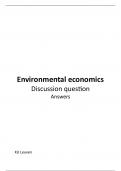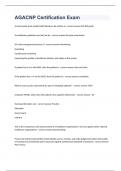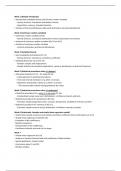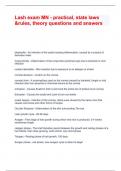Discussion question
Answers
KU Leuven
,Chapter 1: Foundations: welfare, market failure and environment
What, if anything, is wrong with the Pareto principle?
The Pareto principle cannot be used when one person gains and the other loses.
This is a problem because, this is mostly the real-life cases: policies will entail re-allocations
that will involve some individuals gaining and some losing.
Also, the Pareto principle cannot be used to rank alternative allocations. It does not
provide any basis for making interpersonal comparisons.
A third problem is that Pareto optima are not unique.
(What, if anything, is wrong with the social welfare function?
The relative weights assigned to the utilities of different individuals in the social
welfare function are an ethical and political matter. It is better to use the compensation test
(Hicks-Kaldor criteria) to separate efficiency from the ethical question.
It can be possible that a generally accepted social welfare function does not exist.)
What, if anything, is wrong with compensation principle?
The compensation principle is also known as the Hicks-Kaldor principle.
The compensations tests do not align with maximising social welfare. It uses
redistributive taxation to optimise the social welfare objective, though it clearly creates
dead weight loss (DWL). It is not Pareto efficient.
Also, compensation tests give equal weight to winners’ gains and losers’ losses
irrespective of income and wealth levels. Regarding small projects, these issues are
generally ignored in practice.
Theoretically and under certain conditions, the most effective way to deal with
inequality is via re-distributive income taxation, but in practice it could be difficult to identify
winners’ and losers’ relative wealth levels. For large problems like climate change, we cannot
assume all will come out in the wash via redistributive taxation. Therefore, the
compensation tests are not desirable for large problems and need the social welfare
function.
Would the creation of property rights be an adequate policy to protect the environment?
The Coase theorem says that when trade in externalities is possible and there are
no transaction costs, bargaining will lead to a Pareto efficient outcome regardless of the
initial allocation of property rights. Therefore, the government needs to define and enforce
property rights and minimise transaction costs.
Trade: bargaining with property rights
Externality: positive externality = to protect the environment = when the
action of one economic agent affects another other than through the price mechanism or
market transaction + it has beneficial external effects
But this is not the reality: there is quasi-linearity of the profit/utility functions
because there are income effects. Also, there will be transaction (or bargaining) costs due to
the involvement of many people and firms and therefore there will be many efficient
quantities of the externality. The initial allocation of property rights will influence the price
and quantity of the externality which is reached by the bargaining. Even if there is only one
firm on each side and there is no competitive market, there could be inefficiency because of
, private, asymmetric information: if the valuation of the polluter is smaller than the
valuation of the firm who wants to pay to reduce the damage and this is smaller than the
price offered by the polluting firm to the other firm to cancel the project, then the project is
inefficient, but it will take place.
Suppose we assign property right to the polluting agent. Individuals will not pay for
the pollution to be reduced until it reaches the efficient point. The environment is a public
good and there is an incentive to free ride. The marginal benefit (MB) to the polluter is wat
above each individual marginal external cost (MEC). Also, the same problem will arise if we
give everyone a tradable share in the public good. So, even with clearly assigned property
rights, we will still be at an inefficient point with dead weight loss (DWL).
There is a clear role for the government to step in and get us to the efficient level of
quantity of pollution. Government intervention could be to constrain the allowed quantity
(cap, quota), impose a tax on the pollution such that the tax is equal to the optimal level or
run an auction for the right. But if the pollution is dispersing over a wide area, in which
there are many sources of pollution, the government is unlikely to have enough information
to work out the right quantity for each polluting source. This is the issue when wanting to
protect the environment.
Choosing the right total quantity is equal to eliminating the DWL and reaching
the efficient pollution level. Quantity constraints on individual production externalities may
work well when the pollution is localised close to a single source. Since protecting the
environment is not localised, deciding on the right quantity for each polluting source is
difficult. If you use a Pigouvian taxation, this eliminates the DWL. Then, the tax is equal to
MEC and to MB. As with a constrained allowed quantity, you must decide on the total
quantity allowed, but there is no incentive to free ride since the quantity is fixed. Running an
auction for the property right can be based on historic use: grandfathering. This can be an
answer on how to initially allocate permits.
If an externality affects a public good (= the environment), the good becomes rival
and therefore becomes a common good (= non-excludable: once it is provided, it is not
possible to prevent anyone from consuming it + rival: one person’s consumption of it does
diminish its availability for anyone else). Protecting the environment (a positive externality
which affects this public good) can cause a tragedy of the commons and a solution could be
to impose property rights. This means that the common good belongs to one person. But as
stated above, there are many issues coming from the allocation of property rights.
To summarize, the creation of property rights is no adequate policy to protect the
environment.







